A Customer Relationship Management (CRM) system is basically a big database storing information about your customers. The biggest advantage of such a system is that it can automate a lot of tasks you or your team would otherwise need to handle manually. It means faster and more accurate task execution. And as a result, you save time, and money, and make your customers happy.
But, on many levels, every business is a little different. Therefore, you might want to consider creating a custom CRM that would be tailored to meet your exact needs instead of buying a ready-made solution. How can you build your own CRM system with the least effort and without spending an exorbitant amount of money on that? That is what you will learn from this guide.
#1. Decide on the suitable type of CRM software
CRM systems typically come in three flavors: analytical, collaborative, and operational. Each of these types offers a unique set of features and functionalities that you can use to improve customer relations and business operations.
The Analytical CRM is geared toward the collection and analysis of customer data to gain insights into customer behavior and preferences. Collaborative CRM, on the other hand, helps you manage how your customers interact with your business through different communication channels. And finally, the Operational CRM focuses on automation and streamlining of customer-facing processes, such as sales, marketing, and customer service.
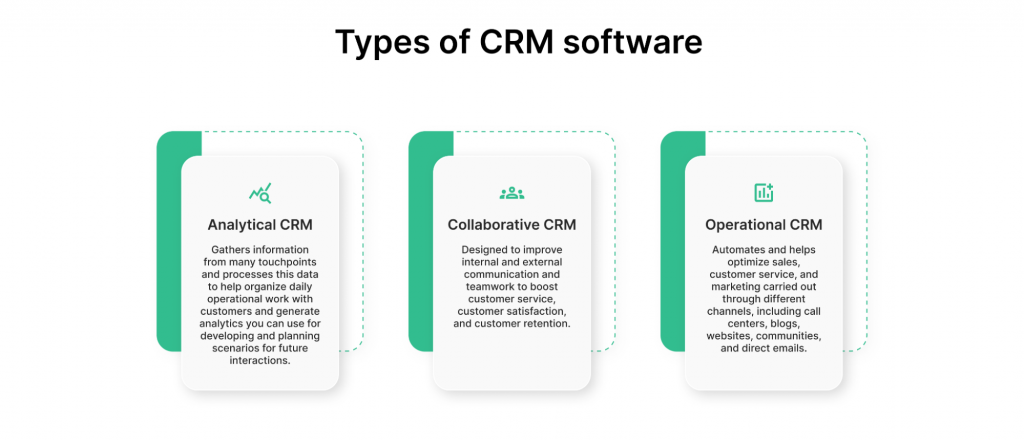
Although a set of typical features for each type will differ, it is possible to mix those features into one system based on your end goals and needs. For instance, you might want your CRM system to be sales-oriented but would also want to add some features that would help your customer support and marketing teams. This way, a custom CRM will be truly yours and you will not need to worry about paying for the functionalities you are not going to use.
So in this step, your main goal is to decide what you want to use your CRM for. This will help you determine and match particular features that will serve the purpose of your CRM.
Looking to nail down your project requirements with confidence? Contact our experts to find the right approach and ensure your project stays on track and within budget.
#2. Decide on your CRM system’s core features
As we mentioned earlier, CRM systems are designed to aid three specific groups: customer support, marketing, and sales. These are quite different teams that take care of different aspects of your business and follow different workflows. Therefore, the features your CRM system will include will depend on the business areas you want your system to support.
Sales
CRM systems help sales managers to collect and store customers’ data. And then, use it to automate sales and personalize offers. Thus, in the case of the sales-oriented CRM, some of the features worth implementing are
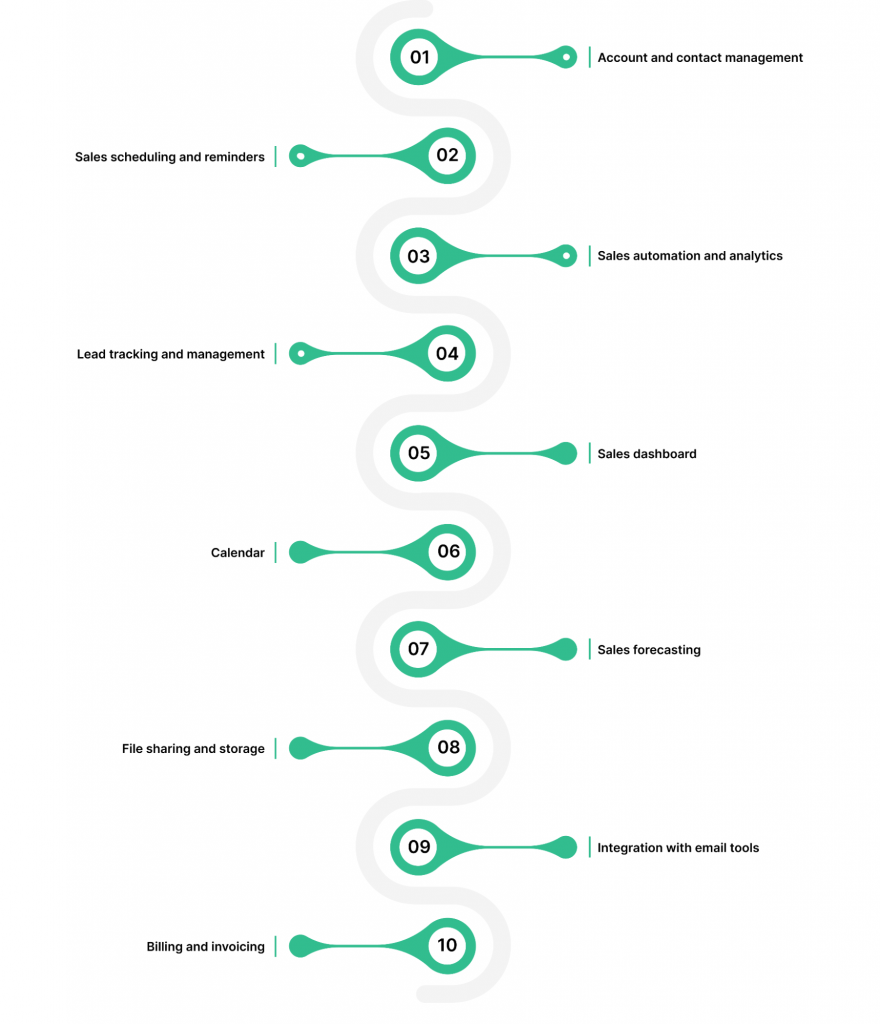
Marketing
Marketing-wise, CRM systems enable marketing teams to plan and schedule their campaigns, set goals and/or KPIs, and cooperate with sales managers. It can also help them connect third-party tools they use for analytics (e.g., organic traffic, or CTA clicks).
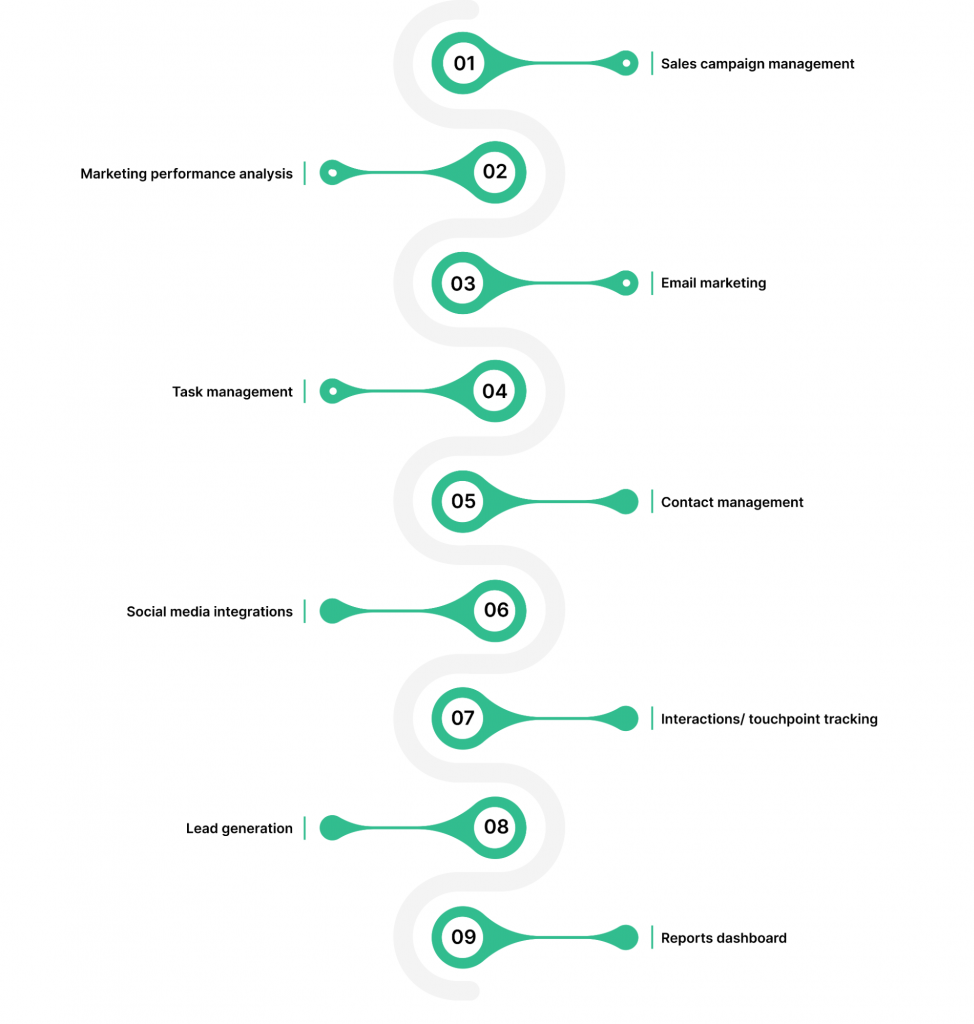
Customer support
CRM systems can also be an effective tool for improving ticket response time and approving workflows regarding customer queries or complaints resolution. Dedicated or custom reports, on the other hand, will help you track, e.g., resolution time or the number of queries over a specific period of time.
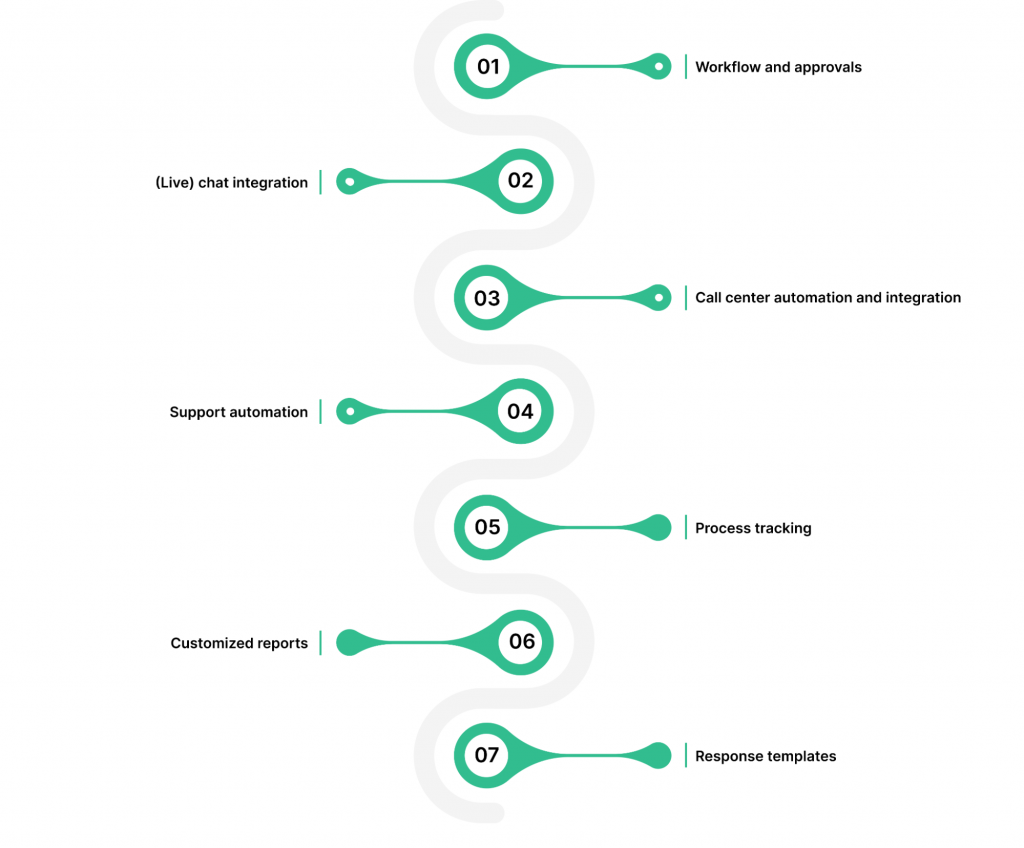
Cross-team features
Some of the features will work both for two or all three teams. But apart from making your custom CRM useful for specific purposes, you also need to consider the security aspects of your system. Since it will likely be used by several people (including yourself) who will have different jobs to do, you may also want to ensure your system has role-based access to certain system features and customer information.
Also, please remember that your CRM will store quite a lot of data. Therefore, do think about how many contacts (i.e., customers, leads) you want your CRM to be able to store. However, CRM systems are not solely for customer-related activities—you can use them to track their hours, tasks, meetings, closed sales, goals per a specific period, and other metrics of productivity.
Related: Why is it Important to Create a Good MVP and Where to Start With it?
#3. Choose a hosting method
You can build your own CRM system to run solely as an on-premise app. In such a case, a decision would need to be made about the operating system your CRM should be compatible with, i.e., MacOS, Windows, or Linux.
On-prem systems also require an infrastructure of servers that will store all the data that would feed your CRM software. This method is expensive and requires several upfront conditions to be met. However, if you are a large-scale organization, you might prefer this option due to, for example, data security reasons.
Cloud hosting, on the other hand, takes away all the overhead technical requirements. And, since cloud-based CRM software is typically accessed through a web browser, it is system-agnostic, meaning that Linux, Mac, and Windows users can access it anytime.
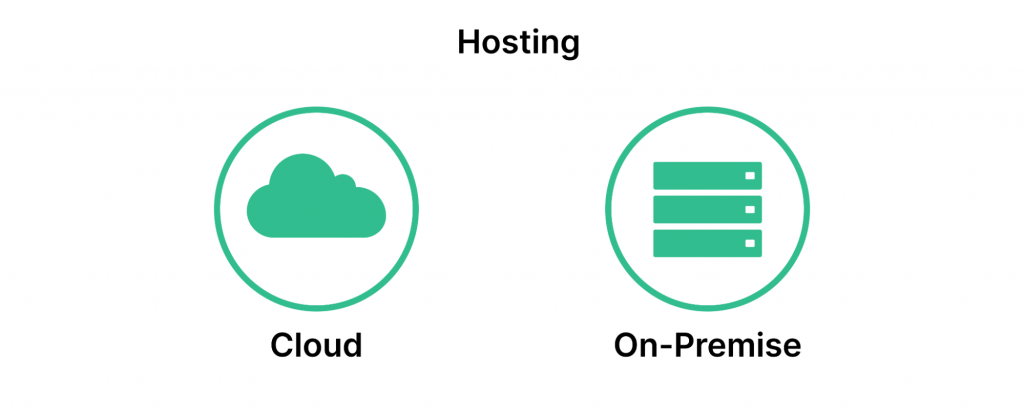
#4. Prepare your budget
The final cost of building a custom CRM app is a result of multiple variables, including the number of features and the overall system complexity. Tasks carried out throughout the development process also involve less technical development activities, such as graphic and UX design.
Still, despite not knowing the precise cost of the development process at this point, you should be able to gauge how much you can spend on it. Having clear figures in mind will help you negotiate and shape the end result of your CRM.
#5. Choose the best way to build a CRM system
Usually, businesses, regardless of their size, would prefer to cut down costs whenever it is possible. Therefore, they need to balance the quality and functionality of the digital solution they want to build.
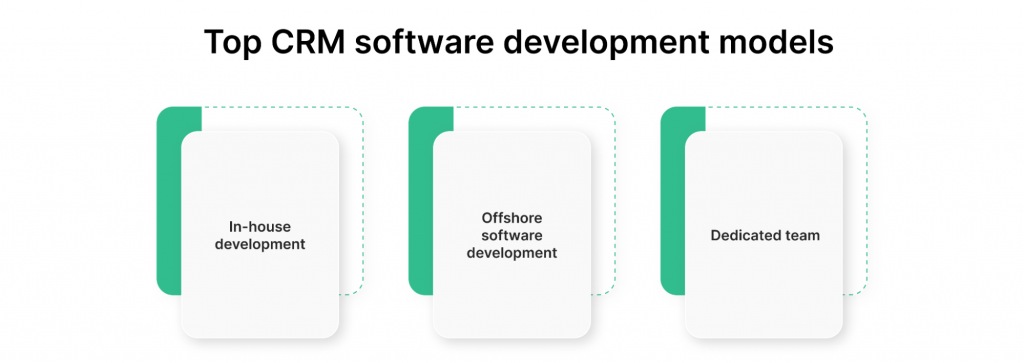
Depending on your financial and resource capabilities, you can build your own CRM system with the help of external contractors or by utilizing your internal resources. However, if you do not have a dedicated software development team in your organization, you can outsource all the necessary skills and get your CRM system on time and within budget.
Thanks to the offshore software development model, you do not need to compromise the quality to avoid exceeding your budget. Today’s offshore teams have a portfolio of dozens of projects they have completed on time and much cheaper compared to the in-house method. So not only can they build a reliable product but also provide you with all the necessary technical guidance; calculate the cost based on your requirements; as well as design, test, and maintain your CRM system.
Check out the IDAP portfolio to find impressive examples of robust CRM systems.
How can you tell if your offshore partner will be reliable?
Apart from the portfolio of completed projects, pay attention to industry expertise. Not every partner can offer a team of well-rounded professionals who are knowledgeable in many aspects of software development, including web and mobile app development.
Moreover, if you are somewhat new to the IT outsourcing approach and want to increase your confidence in this approach, please check individual partners’ reviews. They will tell you a lot about their past customers’ experiences and their projects.
And finally, the development approach itself also plays an important role. Hiring an external team means working remotely and possibly according to different time zones. Therefore, make sure that your future partner is transparent about their process using plain geek-free language and an Agile approach letting you monitor your project progress at every stage of development. After all, you surely want to avoid your project being dropped halfway and the contractors, out of a sudden, going MIA on your custom solution.
#6. Train your staff
When your beautiful and functional CRM takes shape and is ready to be launched, your staff will need some training on how to use it efficiently. Although your software development partner will produce the system according to your specs, it is advisable to ensure everyone knows what your CRM is about and how to work with it.
Summary
IDAP is a team of experienced developers, designers, and managers that provides full-cycle development services to businesses in various industries. We research, design, and build digital products with different functions, including CRMs, and web and mobile apps. Tell us about your CRM system idea and our experts will come up with the best solutions tailored to your needs.



